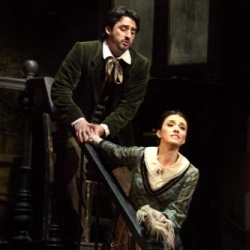La bohème (Royal Opera House)
It’s not only Mimì who’s moribund. Four decades on from its 1974 unveiling, a term has been set on John Copley‘s venerable Royal Opera production of Puccini’s tear-wringer and next year’s revival will be its last. Director of Opera Kasper Holton made no mention of this fact in his generous pre-show speech in honour of Copley and The Linbury Trust, but the audience’s reaction will have left him in no doubt as to the affection in which this legendary production continues to be held. Richard Jones, earmarked to direct Covent Garden’s next La bohème, has a hard act to follow.

© Catherine Ashmore/Royal Opera
As is his custom, Copley himself has been on hand to prepare this revival, and the result confirms what we already know: his skill at staging ensembles is peerless. Even the late Julia Trevelyan Oman‘s jumbled, multi-tiered Café Momus set for the second act – loved by many though not by me – retains vivacity and freshness thanks to his attention to detail. Throughout a hectic sequence in which the spectator doesn’t know where to look first, he uses subtle directorial devices to draw the eye – such as sending two little girls scuttling on from upstage seconds before Musetta makes her first appearance at the same spot.
Simona Mihai projected warmth and vocal strength as this show-stealing hussy, and even if her timbre lacked the ideal Puccinian grace she certainly brought her character to vivid life. Alas, her famous entrance aria made insufficient impact: it felt disjointed under Cornelius Meister‘s baton as the young German maestro over-interpreted what is essentially a glorified cabaret song. In other respects his account of the score was perfectly good: sensitive, nicely shaped and suitably passionate.
Having struggled for the past few years to share everyone’s enthusiasm for Ermonela Jaho, who sang Mimì, I underwent an epiphany of sorts during the final act. The Albanian soprano’s uncanny ability to suffer physically and vocally, somehow rendering herself gaunt and agonised while retaining her beauty and soprano eloquence, resulted in the most affecting Bohème death scene I can recall. Yet earlier on, as at previous encounters with this singer in La traviata and Suor Angelica (two comparably tragic operas), the secco quality of her voice had detracted from the music’s luxuriant romanticism.
As Rodolfo, the American tenor Charles Castronovo was a little below his best and made heavy weather of the great Puccini money notes. However, his legato singing in act three (Puccini’s finest hour, surely) was very persuasive. Of the other men, amid solid support from Markus Werba (Marcello) and Daniel Grice (Schaunard) it was the Korean bass Jongmin Park who stood out on his Royal Opera debut with a Colline of rare warmth. The UK needs to hear more from this exciting singer.
A curious evening, then, that progressed from a routine pair of opening acts towards a devastating finale. The vignette roles – Benoît, Parpignol, Alcindoro – were wittily taken by old hands Jeremy White, Luke Price and Donald Maxwell, and the well-integrated Tiffin Children’s Chorus was a delight. Musetta’s canine companion, as ever, raised both chuckles and a ticklish question: which creature’s pelt became the muff she gives Mimì in act four? Perish the thought, if not the dog.










